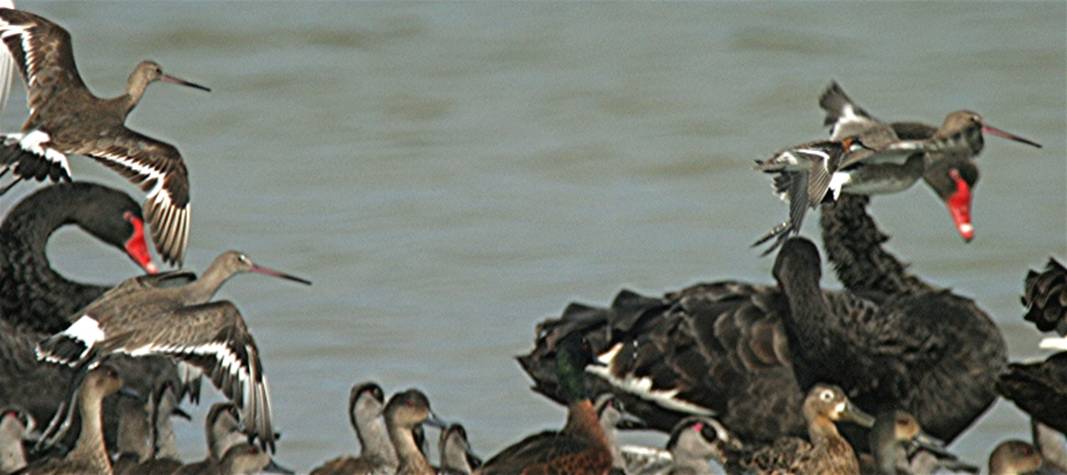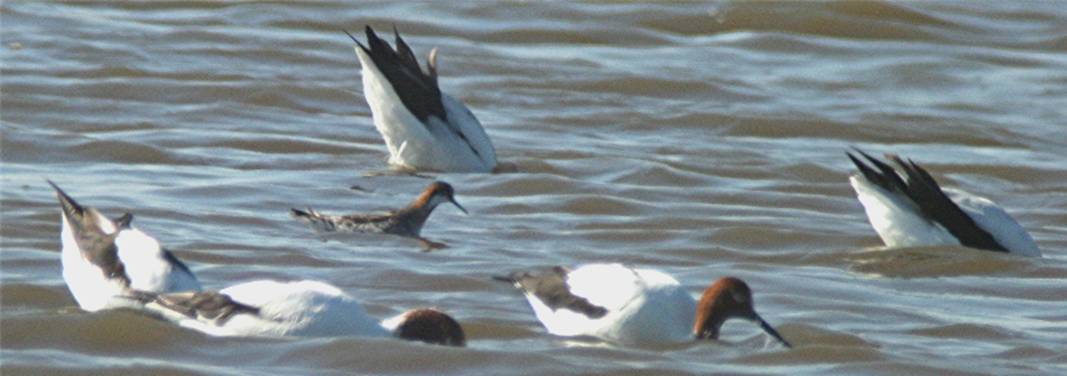I spent most of the last couple of weeks in Victoria, in particular checking the waders at Werribee
Water Treatment Plant, a vast wetland on Port Phillip Bay between Geelong and Melbourne.
Some of you will be familiar with it. To start, would you like to try
identifying the flying birds in this photo:

The main point of interest here is not the Black-tailed
Godwits but the Red-necked Phalarope in breeding plumage, passing abeam of the
right-hand swan. There’s a little story, starting on Monday
30/10, after I’d battled the peak-hour traffic to acquire my
bird-watching permit and shiny new key. I felt my way along, mainly
by seeing which gates would yield to my key, and by late morning found myself
by a lagoon listening to four ‘watchers in a minibus discussing whether
the godwits were bar-tailed or black-tailed. Then along came Ralph, who’d
been having a ‘watch at the You-Yangs, and he said ‘Have you seen
the phalarope?’ to which I replied ‘What phalarope?’. It
turned out an RNP had been hanging around for some months but had, strangely,
just acquired breeding plumage in the ‘austral Spring’ (as the
waders would call it if they read the books) and Ralph was keen to see it in
its new colours. There weren’t any phalaropes there just then so
Ralph drifted off. I spent most of the day accumulating material for my ‘variations
in the non-breeding Sharp-tailed Sandpiper’ series that I might inflict
on you next time the ‘are you sure that’s a Sharp-tailed Sandpiper’
discussion occurs.
At about 5pm I was leaving and stopped to watch some feeding
avocets in about the last pond, when I noticed a smaller bird trailing around
after them. This, it turned out, was not a young avocet, but the
phalarope. When I say it was associating with the avocets, I mean it was REALLY
associating with them, thus:

It was very windy and the light wasn’t all that
good. Barbara and Joy came by and I pointed out the phalarope to them,
and it turned out that they had been keeping an eye on it for some months.
When it took flight with the avocets they were able to follow it with their
binos as it described a great wheeling loop (more than I could do) and came
down at a more distant point on the pond. I should mention, if you don’t
know, that this is a pretty small bird - about the size of a Sharp-tailed
Sandpiper, but of more slender build.
I was there for the next couple of days but didn’t see
the phalarope again, until last Saturday when I was driving out along the track
that runs by the Little River (which, you may be aware is the very geographical
feature after which the band was named, although some say it was the railway
station) when someone driving the other way pulled over to let me past. I
said to him, having learned that this was the customary greeting on coming
across other local students of the avifauna, ‘Have you seen the
phalarope?’. To my surprise he said ‘Actually, yes, it’s
about 2 or 3 lagoons back on the right’.
So that was when I took the first snap above, and the one
below.

Actually, I only took a couple of stills, because I wanted
some video of the unusual swivel-and-peck method of feeding but I took a
few minutes to assemble my longest-possible lens arrangement and then I only
got a few seconds of footage before the little chap flew off.

